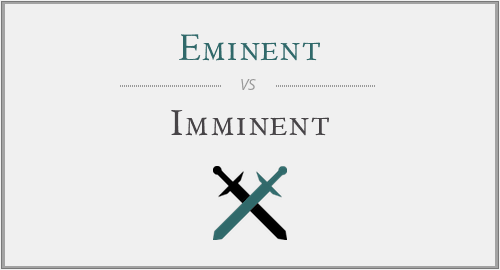Probably seeing them in their written form, “eminent” and “imminent” aren’t very confusing; but once you hear them in conversations, you’ll realize that these words are more similar than you expected. Sounding almost identical, “eminent” and “imminent” represent one of those pairs of words in English which have similar spellings and, therefore, tempt people to use them wrongly and invert their meanings.
If you are in doubt about the meanings or functions of the words “eminent” and “imminent”, this article comes as a quick solution. You will easily understand how to use them correctly and what each represents, so keep reading to clear this matter up!
Eminent vs. Imminent
Both “eminent” and “imminent” are adjectives, used to describe something. “Eminent” is describing a quality, whereas “imminent” is describing a characteristic. So, regardless of their actual meanings, “imminent” and “eminent” are extremely similar, from their spellings to their uses and parts of speech.
Distinguishing them, anyway, is not impossible. The best clue to help you remember their meanings is to take a look at their origin. “Eminent” is an adjective, but it didn’t exist by itself; more exactly, it was formed, from the noun “eminence”. “Imminent”, on the other hand, is an adjective that exists by itself, with a unique meaning and no origin in any other part of speech.
When do we use “eminent”?
“Eminent” describes the quality of being important, famous and respected, usually for something they achieved or did, for their intelligence or their achievements. The best clue to the signification of this adjective is the noun from which it was formed. “Eminence” is the way people address with respect to their leader, usually to a king or a person with a high and important position in a hierarchy.
Example: Please consider his advice, it must be valuable, given his reputation of an eminent historian. – “eminent” is an adjective describing somebody famous and respected.
When do we use “imminent”?
“Imminent” is a simple adjective, less formal than “eminent” and more frequently used in the usual English vocabulary. It describes something coming or happening very soon, a situation arriving that cannot be stopped.
Example: Please think fast about a solution or a way to escape, because this is an imminent danger! – “imminent” is an adjective describing something coming or happening very soon.
Conclusion
“Eminent” and “imminent” are both adjectives, but by no means they can be considered synonyms. They can’t be confused because their lexical meanings are completely different: “eminent” describes the quality of being famous and respected, while “imminent” describes something coming very soon. These short definitions are the only ones that you should keep in mind to make sure you don’t use them wrongly.









Have a discussion about this article with the community:
Report Comment
We're doing our best to make sure our content is useful, accurate and safe.
If by any chance you spot an inappropriate comment while navigating through our website please use this form to let us know, and we'll take care of it shortly.
Attachment
You need to be logged in to favorite.
Log In